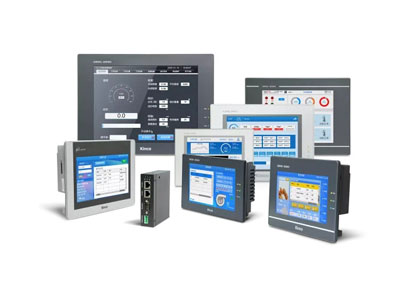What Is HMI In A Factory?
Key Takeaway
An HMI (Human-Machine Interface) in a factory is a system that allows operators to interact with machines and industrial processes. It provides a graphical interface or dashboard where real-time data is displayed, enabling operators to monitor, control, and adjust machinery. This could include controlling production lines, monitoring temperature, and tracking output in real time.
In factory settings, HMI systems help improve efficiency by streamlining machine control and providing immediate feedback on system performance. Operators can quickly identify and address issues, ensuring smooth production. The HMI is crucial for simplifying complex processes and improving overall productivity within industrial environments.
Use of HMI for Factory Automation
HMI is a cornerstone of factory automation, where it is used to control and monitor industrial processes. In highly automated factories, machines and systems are interconnected, often requiring minimal human intervention. HMI interfaces allow operators to oversee these systems, making it easier to adjust settings, diagnose problems, and monitor production lines. HMI systems are integrated with other control devices such as Programmable Logic Controllers (PLCs) to offer real-time data, which ensures that factory operations run smoothly and efficiently.
Through automation, HMIs reduce the complexity of managing multiple machines. Instead of manually adjusting machinery, operators can interact with a single interface that controls several devices. This automation not only speeds up production but also minimizes the risk of human error. HMI is integral to automation in sectors such as automotive, electronics, and consumer goods manufacturing, where speed, precision, and consistency are critical to meeting production goals.

Real-Time Data Monitoring in Factories
One of the most significant benefits of HMI in factories is its ability to provide real-time data monitoring. HMI systems are designed to display real-time information about production, machine status, and system performance, allowing operators to keep track of operations without delays. This real-time visibility is essential for making informed decisions, as it helps detect potential issues before they lead to costly downtime or production bottlenecks.
In a factory, real-time data may include metrics such as machine temperatures, production output, energy consumption, and maintenance schedules. Operators can monitor these metrics via HMI screens, ensuring that any anomalies are addressed immediately. This capability is especially useful in industries where precision is key, such as pharmaceuticals or food processing. By offering up-to-the-minute insights, HMI systems help factories maintain consistent product quality and high levels of operational efficiency.
HMI for Machine Control in Factories
HMI systems also play a direct role in machine control, providing operators with an intuitive way to interact with complex industrial machinery. With touchscreen displays or control panels, operators can easily adjust machine settings, initiate processes, or troubleshoot issues directly from the HMI. This level of control simplifies machine operation and reduces the need for manual intervention.
In modern factories, HMIs can control various types of machines, from robotic arms to conveyor belts, all from a single interface. This centralized control makes it easier for operators to manage multiple machines simultaneously. HMI also enhances safety by offering precise control over machine functions, ensuring that operations run smoothly without unexpected errors or malfunctions. Additionally, HMI allows for customized control interfaces, tailored to specific workflows, which improves the overall usability and effectiveness of the system.
Enhancing Productivity with HMI in Factories
HMI is a key factor in boosting productivity in factories by streamlining operations and optimizing machine performance. With features like real-time data monitoring, machine control, and automation, HMI allows operators to focus on higher-value tasks, while routine processes are managed seamlessly. The ability to visualize data, adjust parameters, and respond to system alarms in real time ensures that production lines operate continuously without interruptions.
Moreover, HMI systems help in identifying inefficiencies or potential bottlenecks in the production process. Operators can use the data collected by the HMI to optimize machine settings, reduce cycle times, or adjust workflow strategies, leading to improved productivity. In addition, modern HMIs can be integrated with enterprise resource planning (ERP) systems, which provides valuable insights into inventory management, scheduling, and production planning, further enhancing overall factory performance.
Safety Improvements Through HMI in Factories
Safety is a critical concern in factory environments, and HMI systems contribute significantly to enhancing operational safety. By providing real-time alerts and visual cues, HMIs enable operators to respond to potential hazards immediately. For example, if a machine’s temperature exceeds a safe threshold, the HMI system can trigger alarms, allowing operators to take corrective action before a malfunction occurs.
HMI systems are also used to automate safety protocols, such as emergency stop procedures or system shutdowns, minimizing the risk of accidents. Moreover, HMI interfaces can be designed to restrict access to specific machine controls, ensuring that only authorized personnel can adjust critical settings. This added layer of control helps reduce the chances of human error, further improving safety standards in the factory.
Additionally, HMIs are often used in conjunction with safety sensors and devices, allowing for real-time monitoring of the working environment. The integration of these systems ensures that factories maintain high safety standards while operating efficiently.
Conclusion
In modern factory operations, HMI systems are indispensable tools that enhance efficiency, productivity, and safety. By providing real-time data monitoring, machine control, and automated processes, HMIs empower operators to manage complex industrial systems with ease. From reducing human error to optimizing workflows, HMI plays a vital role in ensuring smooth factory operations. As factories continue to adopt advanced automation technologies, the importance of HMI in streamlining production and improving safety will only increase. Understanding and leveraging HMI systems is essential for any factory looking to maintain a competitive edge in today’s industrial landscape.
